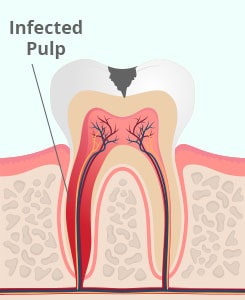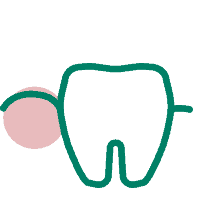When do I need Root Canal Treatment?

During root canal treatment, the dental surgeon will remove the inflamed or infected pulp, carefully clean and shape the inside of the canal, a channel inside the root, then fill and seal the space.
Afterwards, the dental surgeon will place a crown or other restoration on the tooth to protect and restore it to full function. After restoration, the tooth continues to function like any other tooth.
How do you know if you need a root canal?

You may feel pain in your face, jaw, or teeth, due to pain from the tooth. Other causes of tooth pain may include:- Having a cavity
- Gum disease
- A damaged filling
- A tooth infection
It is important to make an appointment with a dentist to find out the cause of the tooth pain, so that the issue is resolved and the infection doesn’t spread.

This can expose the nerves in the tooth and lead to an infection that can spread. A root canal may be required to prevent further infection and pain.

This can range from a dull ache, to a sharp and intense pain, when you drink hot or cold drinks.

Swelling on the gums can come and go. If your gums are painful and swollen, the dentist will examine the swollen gums to find the cause of the inflammation.
Is a root canal treatment painful?
You will feel little or no pain during the root canal treatment, as the dentist will administer a local anaesthetic to numb your tooth and gums. The procedure will feel similar to having a filling replaced. As the wound heals, you may feel some soreness in the area where you had the root canal treatment, though this will go away in a few days.
If you experience pain, swelling, fever, or an uneven bite, after the root canal treatment, you should contact your dentist. Your dentist will examine your tooth to address those issues.
What are the success rates / longevity of a root canal treatment?
An 8-year study looked at almost 1.5 million root canal treated teeth, in which 97% of the procedures were successful (Salehrabi, Rotstein 2004). Failures occurred mostly within 3 years from the completion of treatment. A significant 85% of failures that needed to be extracted had no permanent crown placed after the root canal treatment.
The longevity of root canal treated teeth depends on a variety of factors, including the skill of the dentist, the size of the infection and whether a permanent dental crown was placed after successful root canal treatment.
It is very important that a dental crown is placed soon after a successful root canal treatment. A dental crown prevents a fragile root canal treated tooth from fracturing and subsequently splitting. Should a root canal treated tooth splits, a tooth extraction will then be the recommended treatment option.
How long does a root canal treatment take?
An average root canal treatment can take between 30 to 60 minutes long, depending on how badly damaged the tooth is. If the infection has spread, more work has to be done to remove the infected area and preserve as much of the tooth structure as possible. Such complex root canal cases may take up to 90 minutes and in some instances, treatment may require more than 1 visit.
What can I eat after having root canal treatment?

You should wait until the anaesthetic wears off, before eating, as you could accidentally bite your lip, tongue or cheek.
Hard foods such as ice or nuts should be avoided, as you may injure the wound or cause pain when you bite down too hard on them.
Make An Appointment
If you wish to consult a dentist, you can make an appointment online or contact a dental clinic near you. We have 11 dental clinics located islandwide.
About Raffles Dental
In Singapore, Raffles Dental provides a comprehensive range of services to prevent, diagnose and treat dental and oral diseases. Our dental clinics are conveniently located islandwide, and include Raffles Hospital, Holland Village, Woodlands, and Tampines. We are dedicated to providing the highest standard of professional care and service to our patients.



